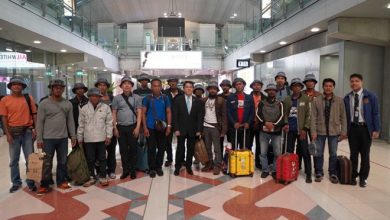Disabled Yemeni girl enters US despite ban
Disabled Yemeni girl enters US despite ban
A disabled Yemeni girl who had been denied entry into the US as a result of US President Donald Trump‘s travel ban arrived in New York for resettlement after a reversal by the government.
Shaima al-Omari, 11, whose case was questioned by Supreme Court justices reviewing the Trump administration’s travel ban, arrived with her family in the US on Saturday, her father Najeeb al-Omari told Al Jazeera.
After denying her application in January, the US embassy in Djibouti changed course and issued visas on Wednesday allowing al-Omari – a US citizen who has been trying to get visas for his wife and three girls for years – and his family to migrate to the United States.
Shaima, who was born with cerebral palsy, suffers severe mental and physical disabilities, according to her family, who say the war in Yemen compounded her suffering as medicine and healthcare services became increasingly scarce in the city of Ibb, where the family resided.
“I’m glad the US embassy eventually reconsidered our case and granted us our rights,” al-Omari said by telephone before boarding his flight from Djibouti to New York.
Al-Omari’s family was among thousands of Yemeni Americans who have been stranded in Djibouti for months, or forced back into war-torn Yemen, after being denied visas to travel to the US because of the controversial travel restrictions – often referred to as the Muslim ban – implemented by Trump.
Unveiled in September, the third version of the ban was allowed to come into full force on December 8, even though it was challenged in the courts. It restricts travel for nationals of five Muslim-majority countries – Iran, Libya, Somalia, Syria, Yemen, as well as individuals from Venezuela and North Korea.
The Trump administration has said the restrictions target countries that inadequately vet prospective migrants to the US and, therefore, represent a threat to US security.
Human rights groups and others argue, however, the ban disproportionately targets Muslims.
Years-long wait
Al-Omari, 39, divided his time between California, where he worked at a petrol station, and Ibb, where his wife and three daughters had lived since 2010, when he was granted US citizenship, 13 years after moving to the US.
But after a Saudi-led coalition of Arab states launched a military campaign in 2015 to defeat the Houthi rebels who had taken over the capital Sanaa in 2014, al-Omari decided it was time to bring his family to the US.
“Providing Shaima with the healthcare she needed was becoming increasingly difficult. So many doctors had left Yemen and the medication she depended on was no longer readily available,” he told Al Jazeera in April.
Al-Omari described a long struggle with the immigration bureaucracy to relocate his family from Ibb to the US, where prospects for Shaima’s healthcare were far better.
After filing their paperwork, the al-Omaris were given a visa interview with US consular officers for January 2018. But while they waited, Trump was elected and eventually enacted the ban.
The Department of Justice had noted exceptions for individuals with compelling reasons to enter the US. Among them were cases where denial would cause “undue hardship” and “an infant, a young child or adoptee [or] an individual needing urgent medical care”.
Mosheer Fittahey, a translator and immigration consultant in New York, who had been advising al-Omari, said he was certain Shaima’s waiver would be granted because of her condition.
But following the January interview, a consular officer denied the application.
“Taking into account the provisions of the Proclamation, a waiver will not be granted in your case,” said the rejection document seen by Al Jazeera.
“Today’s decision cannot be appealed.”
Between December 2017 and January 2018, only about 100 waivers were granted, according to Department of State data.
Ongoing challenges to the ban, led by the state of Hawaii, argue it is based on religious prejudice. Lower courts largely agreed it lacks adequate justification and violates immigration laws prohibiting discrimination based on nationality in issuing visas.
In oral arguments before the Supreme Court on April 25, several justices focused on Shaima’s case, which had been highlighted in a brief filed in March.
Change of course
To the al-Omaris’ surprise, a day before the Supreme Court arguments, an American vice consul in Djibouti sent an email to al-Omari saying their case was being reviewed.
“I determined the very same day that your family’s case clearly met the standard of hardship and necessity specified … and I therefore recommended your family for a waiver,” the email said.

Najeeb al-Omari with his daughters Shaima, Salma, 8, and Lamia, 6, in front of their home in Ibb [Courtesy: Najeeb al-Omari]
“However, I could not inform you of this at the time of the interview because under department rules, the waiver still required review from my supervisor. The waiver was approved,” it said, adding the visas would come after further processing.
According to al-Omari, his family received a call from the US embassy in Djibouti on May 17 telling them to come to the East African country as soon as possible in anticipation of being granted the waiver and receiving their visas.
“We couldn’t believe what we had heard when we received the call,” said al-Omari.
“As soon as we arrived in Djibouti, we received another call from the embassy and we were asked to come in the same day. We were handed our passports and visas on Wednesday and arrangements for our flight to New York were soon under way.
“It was a feeling of sheer happiness. After all this hardship, waiting and losing all hope, things had finally worked out,” al-Omari said.
Wave of change?
According to Fittahey, who set up a Facebook page to advise Yemeni migrants on how to proceed, the number of Yemeni applicants whose waivers were approved appears to have increased following the Supreme Court’s arguments.
Fittahey said, like al-Omari, many of those applicants previously had been denied without explanation or opportunity to appeal.
“They [the consular office] are sending applicants emails saying that the waiver is being reconsidered and that they should check the status of their applications online,” he told Al Jazeera.
“I don’t know what prompted this change, but maybe the consular office was given a revised idea about how to process the waiver requirements.”
The Supreme Court’s ruling on Trump’s travel ban is expected sometime in June.
For the latest news update please visit Saafifilms.com For more entertainment visit Saafistudio.com





